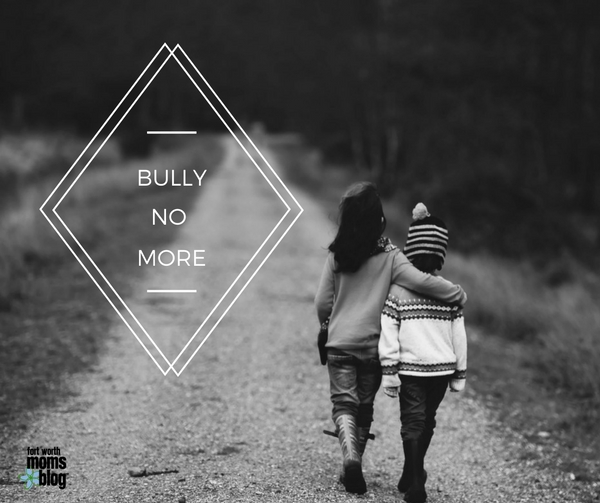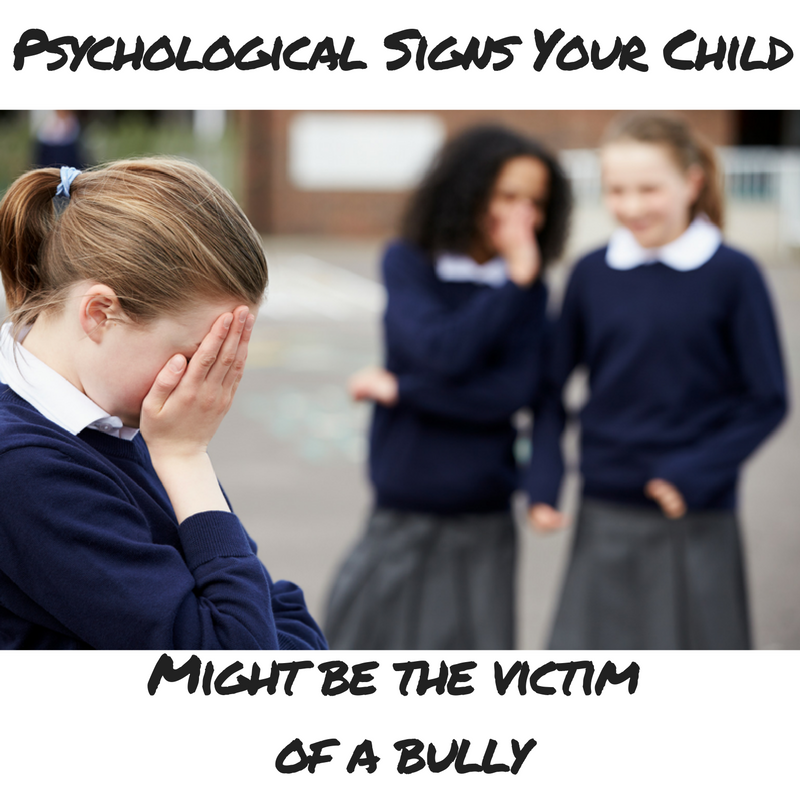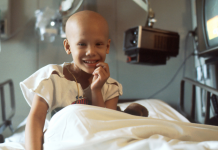This post is part of “Bully No More,” an editorial series hosted by the Fort Worth Moms Blog.

As parents, we hear a lot of convincing statistics about the effects of bullying. But as a clinical psychologist, I am even more convinced by the longterm psychological damage I witness regularly in my adult clients who have been seriously bullied. Okay, so I don’t want to scare you. Don’t moms have enough to fret about without adding bullies to the mix?! That being said, I do want to help raise awareness so you might notice the early signs and symptoms when there’s still time to intervene.
Bullying is far more than a couple of mean comments, which nearly every kid will experience. Being targeted, teased, and even tormented for being different in some way is NOT a normal part of childhood. It is serious. It can be traumatic. And the support and guidance of parents can make an enormous difference in the outcome.
According to stopbullying.gov, a quarter to a third of our little ones will experience bullying in some form. And, unfortunately, it’s even easier now that smart phones and social media have given rise to cyberbullying. The National Institute of Mental Health (NIMH) highlights the data on the longterm effects of being bullied, and they are frightening. These include a much higher risk of of anxiety disorders, depression, and even suicidal thoughts or behavior. The victims of bullies are also at an increased risk for problems with aggression, poor adult relationships, and substance abuse.
What to Look For
Of course, we want to keep our littles and teens safe from harm. The challenge is bullies often undermine our ability to know that our kids are in danger. They do that by inducing shame. Shame is different from guilt. Guilt is the sense that you’ve done something wrong. Shame runs deeper. It says, I am something wrong and there’s something inherently bad about who I am as a person. Needless to say, shame is one of the most painful emotions we can ever experience. And it tends to live in the deep darkness. The first instinct of most children (and most people for that matter) is to hide shame. And it’s for this reason that bullies can have such a profound effect on a child’s self-esteem.
But there are a lot of signs that we as parents can identify to help us uncover a possible bully. The key word here is CHANGES. Changes in these areas tell us it’s time to investigate further:
- Mood: Not every child who’s depressed appears sad, although depression can certainly look like sadness. Many depressed children (especially boys) appear irritable and aggressive, particularly toward people close to them. Often, parents and siblings may feel like the “safest” targets for a child’s anger because the child knows that these relationships are the most loving, stable, and enduring. Of course, this can be especially painful and confusing for the parents and siblings on the receiving end. Other mood changes to watch for are increased anxiety, worry, and fearfulness. It’s important to remember that many situations that seem mildly annoying and irritating to adults (e.g. being called mean names) can be felt as very scary and hurtful to children, who don’t have the decades of practice coping with these types of situations that adults do.
- Appetite: Some children may cope by overeating whereas others may suddenly tell you they’re not hungry or their stomach hurts.
- Socializing: If your social butterfly is suddenly uninterested in spending time with friends or family, it’s time to start asking questions. Social isolation is a red flag for many budding mental health issues, including those related to bullying.
- Sleep: While it can be hard to separate a teen sleeping in till noon from the excessive sleeping related to depression, remember that you’re looking for changes in sleeping behavior. On the other hand, many children and teens might react the opposite way and have a harder time sleeping due to racing thoughts, worry, or nightmares.
- Aches and Pains: While you certainly want to rule out a genuine medical cause with your child’s doctor, many victims of bullying report vague physical symptoms such as headaches, stomach aches, body pain, poor energy, and diarrhea or other digestive difficulties. The body interconnects with the mind, and these physical symptoms can commonly be associated with psychological stress.
- Control: The victims of bullies often feel very helpless. Many times, children and teens in these situations may find other areas of their life to increasingly control. This may look like rigid organization, over-controlling one’s plans or day, or even over-controlling one’s eating. Unfortunately, children who attempt to exert extreme control also tend to become very upset when that perceived control is disrupted (e.g. brother knocks over the toys sister organized when the movie the family planned to see is sold out).
- Avoidance: This sign can take the form of avoiding certain people, places, things, or situations that remind the child of the bully. Avoidance can certainly yield some benefits for children coping with bullying behavior (e.g. avoiding walking home alone). However, avoiding processing the situation or painful memories is a recipe for longterm psychological distress.
- Self-Destruction: Reckless behaviors such as using drugs and alcohol, harming oneself physically (e.g. cutting, hitting self), driving excessively fast, overspending, skipping school, criminal activity (e.g. vandalism, shoplifting), and the like are all common signs of an underlying problem.
If you suspect that your child is being bullied, it’s important to ask questions from a kind, caring, and non-blaming stance. Many parents and children may also need professional support to navigate and heal from experiences with bullies. If you or your child are experiencing difficulties in these areas that don’t resolve within a few weeks, it’s time to see a professional.














Just so unbelievably true and relevant! Very well written.